|
|
|
Sort Order |
|
|
|
Items / Page
|
|
|
|
|
|
|
| Srl | Item |
| 1 |
ID:
185144
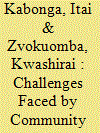

|
|
|
|
|
| Summary/Abstract |
Volunteer scholarship in Zimbabwe tends to focus on volunteer motivations, volunteers’ role in community development and, to a lesser extent, volunteers’ challenges. In this study, we captured the lived experiences of volunteers in the current milieu of socio-economic challenges. We discovered that the major challenges affecting community volunteers in the Chegutu District are poverty and vulnerability, burnout, too much work, lack of community appreciation of volunteerism and lack of adequate volunteer paraphernalia. We move beyond other studies to explore how volunteers are coping with the challenges. Volunteers are reliant on spiritual support and encouragement by some community members. The study adopts a qualitative approach with data collected using in-depth interviews and focus group discussion. The findings are presented and discussed thematically.
|
|
|
|
|
|
|
|
|
|
|
|
|
|
|
|
| 2 |
ID:
168472
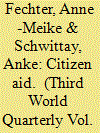

|
|
|
|
|
| Summary/Abstract |
The introduction to this collection brings together, under the umbrella terms of citizen aid and grassroots humanitarianism, interdisciplinary research on small-scale, privately funded forms of aid and development. It notes the steady rise of these activities, including in the Global South as well as North, such as in the context of the recent European refugee crisis. It considers their position vis-à-vis more institutionalised forms of aid; methodological approaches and their challenges; and asks what political dimensions these initiatives may have. It outlines key themes arising from the contributions to the collection, including historical perspectives on ‘demotic humanitarianism’, questions of legitimacy and their apparent lack of professionalisation, motivations of their founders, the role of personal connections, as well as the importance of digital media for brokerage and fundraising. Being mindful of its critiques and implicit power imbalances, it suggests that citizen aid deserves more systematic academic attention.
|
|
|
|
|
|
|
|
|
|
|
|
|
|
|
|
| 3 |
ID:
168476
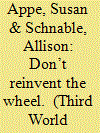

|
|
|
|
|
| Summary/Abstract |
How can support organisations build the capacity of volunteer-driven non-governmental organisations (NGOs)? Citizen aid for relief and development has expanded rapidly in the twenty-first century, and the number of American aid organisations operating in the Global South has grown to nearly 10,000. These grassroots international NGOs – GINGOs – are small-budget, volunteer-driven organisations typically launched by Americans without professional experience in international development or nonprofit management. These groups prize the expressive and voluntaristic dimensions of development work, yet face challenges of amateurism, material scarcity, fragmentation, paternalism and restricted focus. We investigate whether support organisations, whose primary goals are to build the capacity of organisations and strengthen the organisational field, offer solutions to GINGOs’ inherent weaknesses. We draw on 15 semi-structured interviews with a stratified selection of support organisations, including associations tailored towards international development and towards nonprofit work at large. We find that support organisations offer resources to help GINGOs in managerial and administrative domains. Fewer support organisations help GINGOs build technical development skills, and fewer still push GINGOs to critically reflect on their role in development. We find that peer learning and online platforms could help engage GINGOs volunteers in networking spaces, even as their geographic dispersal in the US encourages their fragmentation and isolation.
|
|
|
|
|
|
|
|
|
|
|
|
|
|
|
|
| 4 |
ID:
164046
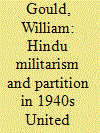

|
|
|
|
|
| Summary/Abstract |
The United Provinces and its urban centres were not in Partition’s immediate hinterland or a key subject of its high politics, but were pivotal, this paper argues, at an alternative scale of political mobilisation around volunteer movements. Central to this process were the spatial dynamics of organised violence in the early to mid 1940s, not least because of how pivotal organised killings were by 1947. By exploring the provincial patterns of the development of volunteer movements, their spatial and their inter-communal associations over time, and their ideological content (using a case study focussed on P.D. Tandon), the article argues that there were longer-term associations between organised volunteer activities and instances of pre-Partition violence that foreshadowed the large-scale attacks of the summer of 1947. This potentially affects the way historians read Partition violence as a specific ‘moment’ of communal antagonism and the significance of these movements’ ideologies of violence to India’s long Partition.
|
|
|
|
|
|
|
|
|
|
|
|
|
|
|
|
| 5 |
ID:
168208


|
|
|
|
|
| Summary/Abstract |
In his seminal study of the changing nature of warfare between Agincourt and the Somme, military historian John Keegan proposed that future historians might consider combatants’ emotions in their assessments of the impact and nature of conflict. Recent years have witnessed the emergence of the history of emotions as an analytical approach, but rarely, if ever, is this directed toward the study of military history, far less the history of insurgencies and counter-insurgencies. This paper examines America’s civil war (1861–1865) as a case study of the ways in which an emotional history approach might illuminate not the physical experiences of but rather the immediate and longer-term reactions to counter-insurgency conflict through a focus on one specific individual, the future Supreme Court Justice Oliver Wendell Holmes, Jr. It proposes that Holmes, whilst not a man of the ranks, nevertheless can reveal the wider ramifications of civil war and its emotional impact, both individually and culturally. As a relatively limited internecine war, one not fought by professional armies but by volunteer forces, America’s civil war highlights the ways in which the soldier’s response points us toward the kind of emotional revolution that has, to date, mainly been located within the European nations.
|
|
|
|
|
|
|
|
|
|
|
|
|
|
|
|
| 6 |
ID:
168020
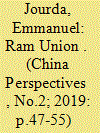

|
|
|
|
|
| Summary/Abstract |
The Ram Union is a non-profit social organisation established in 2003 in Zhejiang Province. Its transformation from a local entity into an international NGO tells us about the methods implemented by the Chinese Communist Party (CCP) to accompany the development of popular associations or minjian, which appear to be external to the Party but which in fact are fully sponsored by it. Studying such organisations is a complex matter, as they appear to act in a benevolent and apolitical manner, while being completely integrated within the political and social apparatus of the Party-state (Youth League, volunteers, United Front, ministry of Civil Affairs, etc.). The historical trajectory of the Ram Union thus gives us insight into the CCP’s overlooked strategy of hybridisation, involving mass organisations that came out of the revolutionary period and charitable groups embodying modern Chinese society. This strategy is designed to occupy the social arena and forestall the emergence of an autonomous Chinese civil society in the People’s Republic of China (PRC) or among the Chinese diaspora overseas.
|
|
|
|
|
|
|
|
|
|
|
|
|
|
|
|
|
|
|
|
|